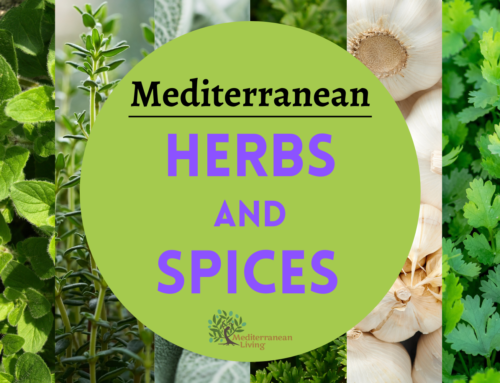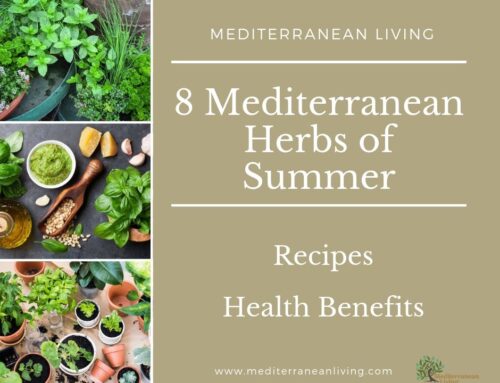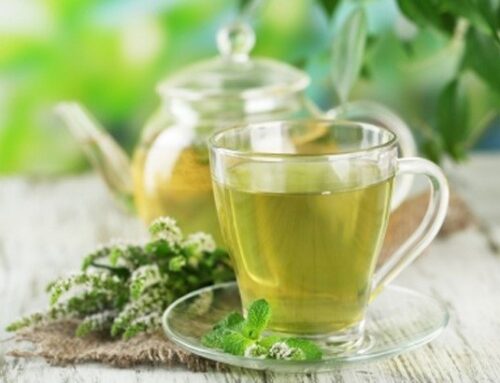Lemon Balm: Summer’s Remedy for the Busy Mind
By Christine Kenneally
Updated October 21, 2021
In the Mediterranean, the growing season lasts for much of the year. One of the principles of the Mediterranean Diet is to eat what is in season, and what is abundantly available. July is a month of great abundance in our gardens here in New England, and one of the plants that grows most heartily and perennially is lemon balm, a member of the mint family. Lemon balm also grows wild in most Mediterranean countries. You may recognize this plant by its lush green leaves, or the intoxicating lemony, minty smell it releases every time you brush against it.
What you may not know is that lemon balm has an important place in the kitchen as well as the garden! In Greece, it is one of many types of wild greens, or horta* that are a central part of nearly every meal. It adds a fresh lemony flavor to lighten up heavier meat and poultry dishes and it complements lighter bean and grain dishes. Add it to your dish at the end of cooking, as you would parsley, cilantro or basil, as cooking can diminish the flavor. Or use it in cold dishes, such as green salads, fruit salads, or my favorite- pesto! Check out my Rustic Lemon Balm Pesto recipe, which is linked below.
Add delicious lemon balm to any dish as a substitution for lemon juice. It also complements a green salad or fruit salad very well. Many people use lemon balm as a flavoring for both hot and cold drinks. Make lemon balm ice cubes to add just a hint of lemony-minty flavor to your water or lemonade, or brew the fresh leaves as a hot tea. Add honey and ice it down to serve cold on a hot day.
In addition to its delicious summery flavor, lemon balm, whose Latin name is Melissa Officinalis, attracts bees, resulting in honey that has a lemony flavor! If you want the bees to come to your garden, grow this plant! Bees have a highly organized and busy work structure, yet they move about in a calm, focused, rhythmic and almost hypnotic way. Interestingly, lemon balm’s most notable medicinal benefit, easing tension and promoting calm focus, seems to be very connected to the bees. To me, this lesson from the bees is important, as I tend to get over-stimulated and stressed out when I am very busy.
I sometimes have a hard time focusing on just one task, and I try to do too many things at once. Many people feel this way in the summer, when the days are long and the sun gives us so much energy. Lemon balm is the perfect herb for the over-stimulated mind, with its calming, slightly sedative properties. Many herbalists prescribe lemon balm tea for anxiety and panic attacks, as well as for mild depression, as it has a very uplifting effect.
Lemon balm is very beneficial for the nervous system, and, similar to other culinary herbs, it is calming to the stomach, helping us to digest our food better and relieve cramping and bloating. It is quite high in minerals and vitamins, which makes it a great healthy addition to any diet. It is a wonderful cold and flu remedy, with its antiviral and antibacterial properties. It also helps us to cool down, by opening up channels in the body so energy flow can be restored, and heat can be released through sweating.
If you are interested in learning more about the medicinal uses and scientific studies backing these statements, visit the Herb Society website.
Whether you’re using lemon balm in your cooking or in a medicinal way, it’s best to use the plant fresh, instead of dried. The reason is that it has a high volatile oil content, which is the compound responsible for most of the flavor, scent, and medicinal actions. The volatile oils are most present in the fresh plant, and they dissipate with drying. If you’d like to use this plant all year long, consider freezing it.
Here is my recipe for Rustic Lemon Balm Pesto. If you’re looking for other ideas for way to bring this wonderful herb into your kitchen, here are a few to try:
Lemon Balm Chicken– Use handfuls of fresh leaves to stuff the cavity of a whole chicken to impart a subtle lemon flavor.
Lemon Balm Fruit Salad– Cut up your favorite fruit- melons, oranges, strawberries, etc. and top with chopped fresh lemon balm leaves.
Herbed Butter– Chop fresh lemon balm and whatever fresh herbs you have on hand (thyme, parsley, oregano, chives). Soften a stick of butter and mix in the herbs. A good ratio is 2 T of chopped fresh herbs to one stick of butter. Chill overnight and use on toast or steamed veggies.
*If you are interested in reading more about horta, check out “The Food and Wine of Greece: More than 300 Classic and Modern Dishes from the Mainland and Islands of Greece” by Diane Kochilas.
Sources:
Thyme Herbal, Brittany Nickerson
You can visit her website here.
‘Herbs in Cooking: Dietary Choices from Nature’s Pharmacy’ by Maria & Nikos Psilakis
‘Practical Herb Garden’ by Jessica Houdret
The Herb Society
Stop by and visit the society.












Bill Bradley, R.D. says:
Bill Bradley, R.D. says:
Bill Bradley, R.D. says: